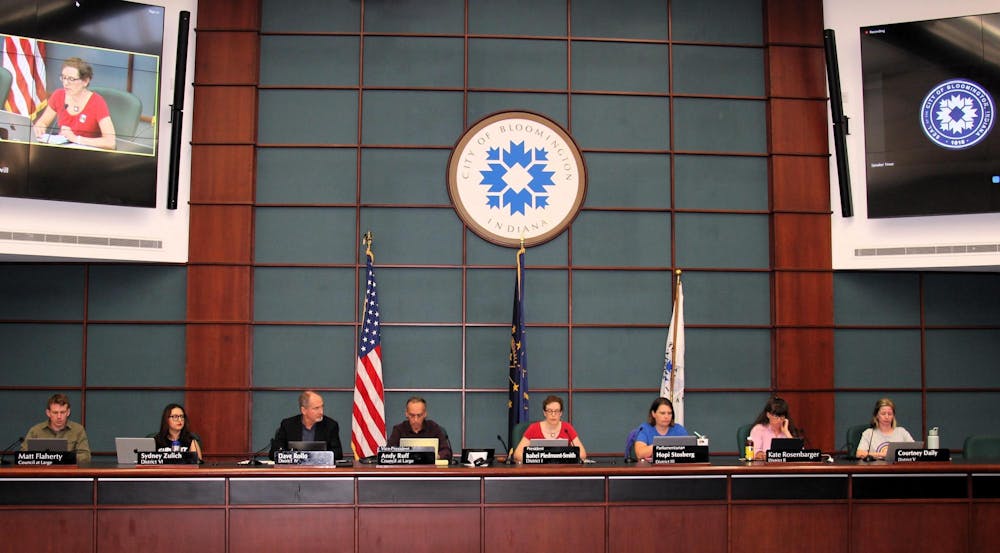The Bloomington City Council’s 2026 budget priorities discussion Wednesday heavily revolved around affordable housing and transportation.
Council President Hopi Stosberg began the discussion by asking the public to fill out a survey on their budget “outcome area” priorities. Some areas included public safety, transportation and mobility, economic health and jobs and neighborhood livability and social health.
She then asked council members for their top outcome areas. Many mentioned public safety, affordable housing and homelessness and transportation and mobility.
They then named specific priorities within all of the outcome areas.
Councilmember Dave Rollo supported road maintenance, particularly for streets he said have been neglected for too long. Mayor Kerry Thomson also mentioned road maintenance as a priority during her State of the City address last week.
Councilmember Matt Flaherty called for annual capital funding for “chronically underfunded” sidewalks, multi-use paths, protected bicycle lanes and intersection treatments, like shorter crosswalks and accessible curb ramps.
The council spoke extensively about the Unified Development Ordinance, which governs land use and development, after councilmember Sydney Zulich suggested adding funding to support a potential change to it. Councilmember Isak Nti Asare said he agreed, and that last year Planning Director David Hittle estimated the cost to be around $300,000 to get consultants to start a full overhaul process instead of “changing around the edges” of the existing UDO.
Asare said he thinks the city needs a form-based UDO. City planning has three elements, he said: land use, management and form. There are multiple schools of thought on zoning. A Euclidean-based UDO separates land based on its use. A form-based UDO would instead focus on the form a building should take.
Asare said a form-based UDO would make the development process, including permitting, easier for developers while maintaining desirable characteristics in certain zones. He also advocated for funding online permitting tools to make the process friendlier to developers.
Councilmember Isabel Piedmont-Smith said the UDO change would work well with her idea for a housing summit with affordable housing builders, where the city could get ideas for the overhaul.
Flaherty also supported funding for a UDO overhaul plan, which he said could be a form-based change. He said he would like more clarity from the city administration on if it is ready for a full UDO redo.
Rosenbarger supported a form-based code, too.
“The idea of having a restaurant that looks like a house next door to my house is a dream, I would say,” Rosenbarger said.
She said, though, continuing to make updates to the current UDO can steer the city toward a form-based code.
“I want a form-based code, and I want to make immediate changes to our UDO to help our housing supply problem,” Rosenbarger said.
Rosenbarger and Flaherty introduced resolutions to start to amend the UDO relating to housing last month, but the council failed to introduce them during its meeting.
Piedmont-Smith said they should set aside money to support city programs that receive federal funding, like homeowner repair programs and down payment assistance. She said she expects the programs’ funding will get cut by the federal government, but they help keep people housed and need to keep going.
“We have to recognize that the federal landscape and support for affordable housing from the federal government is very different this year than it was in the past,” Piedmont-Smith said.
The meeting Wednesday was just the first step in setting the council’s 2026 budget priorities. According to the meeting packet, the Special Fiscal Committee will develop a prioritized list April 16 based off their discussion this week. The full council will vote on this finalized list April 30. Then, the council and city administration will deliberate their shared priorities May 14.
There will likely be a follow-up budget discussion in late July before formal budget presentations, according to the packet.
This year’s budget was adopted in October 2024. That came after some councilmembers said they were unsatisfied with Thomson’s budget proposal, which they said did not include their budget priorities. They were ultimately able to compromise on specific funding for transportation, infrastructure and safe street projects.




